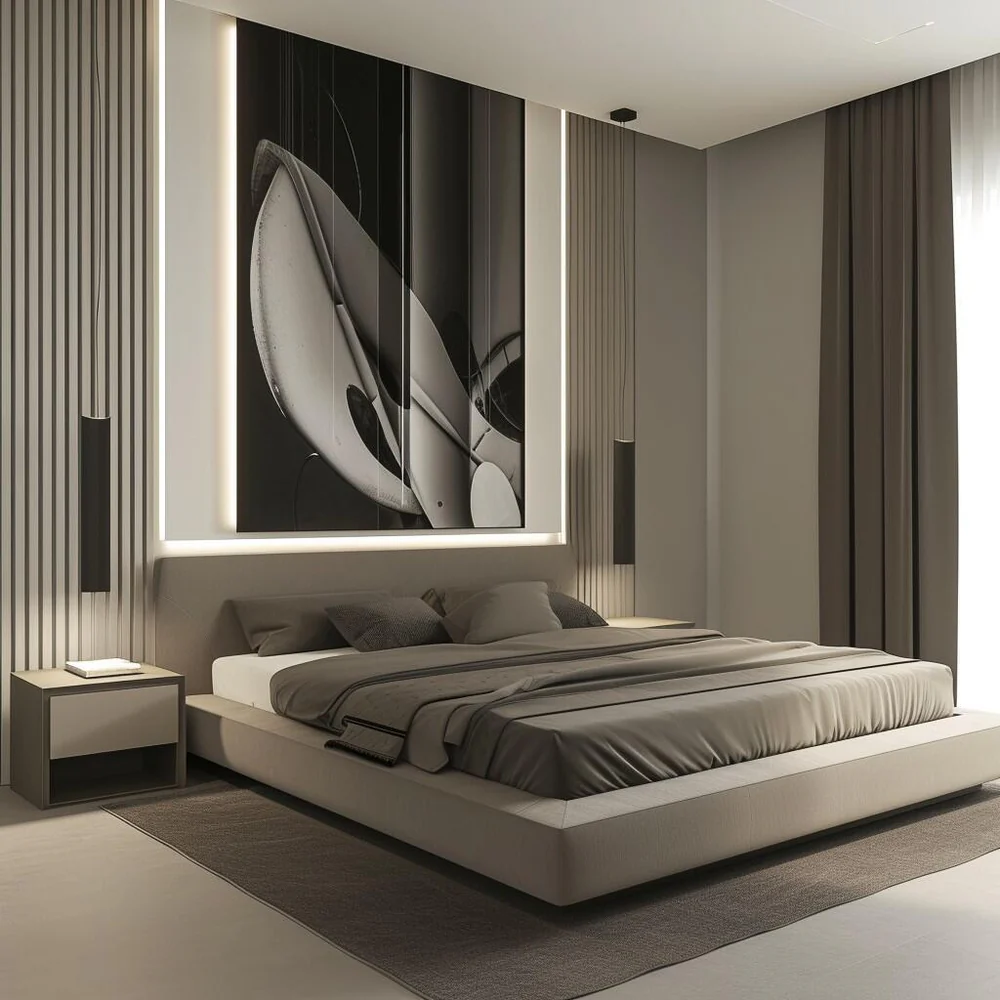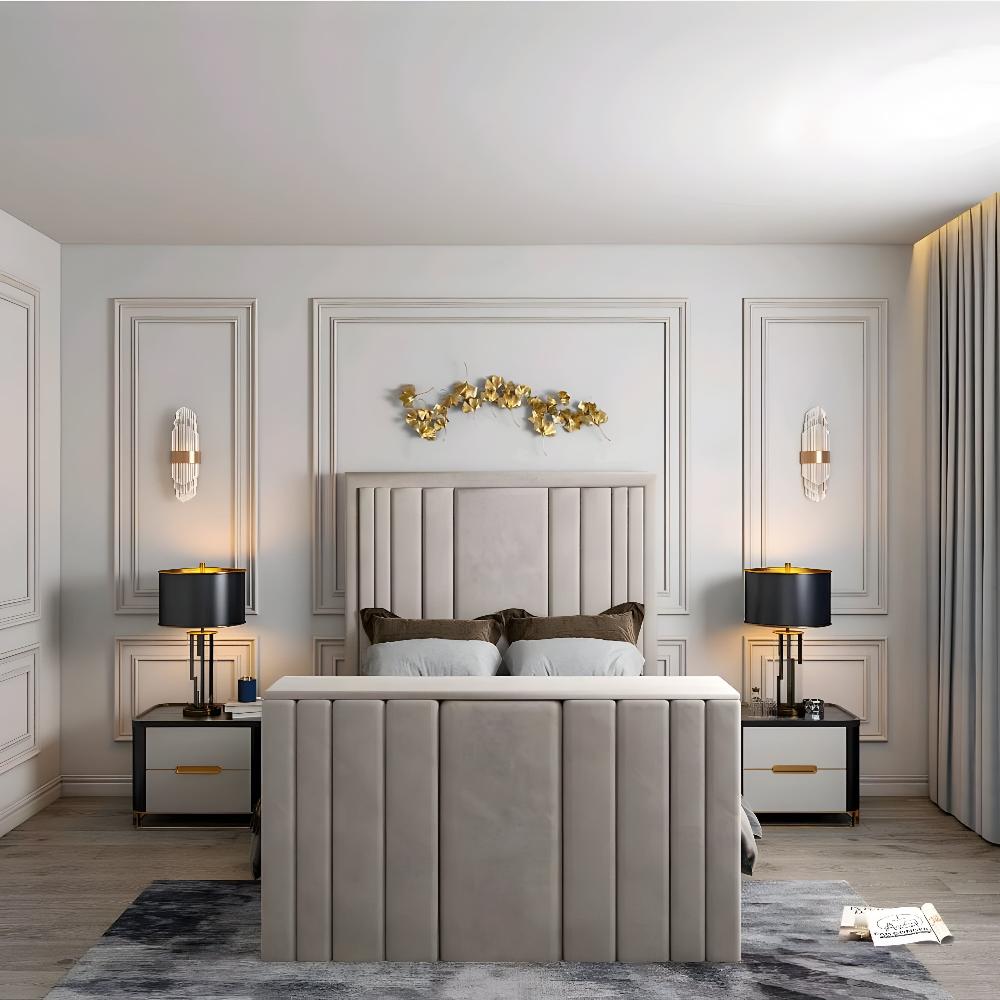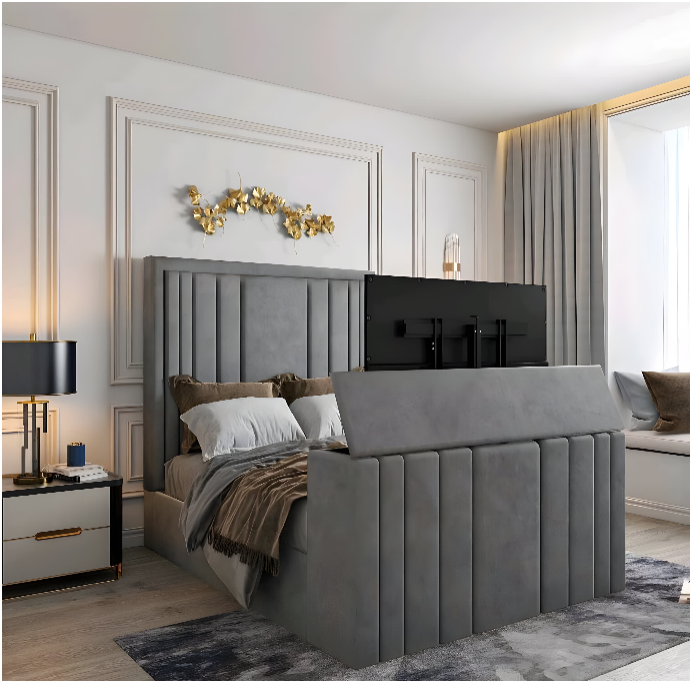
Buy Floating Bed UK – Space-Saving Luxury Backed by Expert Tips
Small flat feeling crowded? Floating bed UK creates more space & a modern look. Find durable, stylish frames at Famaya.
Introduction
Traditional bulky bed frames can make your bedroom look cramped. In UK homes—especially small flats—space is limited, so homeowners look for furniture that saves room while keeping a stylish look.
A floating bed solves this problem. Since the legs are tucked away, the bed appears to hover above the floor. Many people love the modern, clean look and the way it makes a small bedroom feel bigger. Some beds also come with LED lights, adding a soft glow and futuristic design.
Tip: If you want both space-saving and luxury comfort, a king size TV bed can also be a good choice for families.
What Exactly Is A Floating Bed?
A floating bed is a bed frame built with hidden supports. Unlike normal frames with visible legs, it creates the illusion of floating in the air.
For Example, some modern bed frames in the UK come with under-bed LED lights, which make the floating illusion more dramatic and add a soft glow to the room at night.

Floating Bed Design And Styles
These beds are available in several designs:
Modern minimalist designs
These beds have simple lines and light frames, making them ideal for small bedrooms. They give a clean look and save space easily.
Luxury designer styles
Made with fine materials, these beds bring rich style and comfort. They add a classy touch to any room with a soft, modern design.
LED light designs
These beds include soft LED lights under the frame. The glow makes the room look modern and creates a calm feel at night.
Materials And Build
Different materials affect strength and durability:
Solid wood floating frames
These are strong and warm. If you like natural wood that lasts for years, this choice is for you. Simple, durable, and cosy for any bedroom.
Metal floating frames
These are slim and sturdy. If you want a modern and clean look, go for metal. They are strong, stylish, and save space in your room.
Upholstered beds
These come with soft padding. Covered in fabric or leather, they give comfort and a cosy feel—a great choice if you love soft finishes. The durability depends on quality and size. Larger frames, such as super king size bed dimensions, need stronger builds.
Floating Beds And Bedroom Aesthetics
These beds give the illusion of more space. With no visible legs, the floor area looks open, making small bedrooms appear larger.
They also fit perfectly with modern interiors. Minimalist homes, Scandinavian designs, or luxury-style bedrooms all benefit from their sleek look. For bigger statement pieces, consider super king size bed frames UK.

Comfort Meets Functionality
When choosing a space-saving bed in the UK, both comfort and usability are key:
- Mattress fit – Most standard UK mattresses work well, but always check UK bed sizes to ensure a perfect match.
- Stability & support – Quality frames are built to handle adult weight safely without wobbling.
· Storage options – Some designs include drawers or hidden storage.
· Safety concerns – A strong bed frame follows UK safety rules and stays steady without wobbling.
Installation and Maintenance
Wall-Mounted Designs
These attach directly to the wall, offering extra stability and a modern, secure feel. Ideal for those who want a permanent setup.
Frame-Based Designs
These stand independently on hidden supports, making them easier to move and place anywhere in the room. Compare with single wooden bed frame UK if you prefer a simpler style.
Easy Setup And Care
Setting up your minimalist bed frame UK is simple. You follow the clear guide, and it is ready in no time. To keep it looking fresh and safe, try these easy care tips:
· Use a soft cloth to wipe the frame regularly, keeping it clean and looking fresh.
· Check screws and brackets now and then for safety.
· Keep the LED lights free from dust.
· Avoid using harsh cleaners that may damage surfaces.
· Tighten loose fittings when needed.
Floating Beds vs Other Beds – Explained Simply
Floating Bed vs Platform Bed
These beds look light and modern, while platform beds are heavier and more classic. Floating beds make small rooms look bigger, while platform beds feel more traditional and solid. A floating design works well with a 4ft small double bed and mattress, giving comfort and saving space.
Floating Bed vs Traditional Frame
These beds hide their legs, saving space and making cleaning easy. Traditional frames are bulkier and take up more space, but may feel more familiar.
Pros
· Saves floor space and makes rooms look bigger
· Modern and stylish design
· Easy to clean under
· Works well in small flats
Cons
• Can cost more than normal beds
• It may be harder to move
• Needs careful setup for safety
In short, modern space-saving beds are stylish and space-friendly, while traditional beds are classic and bulky. Choose modern if you want style and space, conventional if you want simple comfort.
Buying Guide about Smart Beds
Before buying, check these points carefully so you know you’re making the right choice:
· Size and mattress fit – Make sure the bed matches your mattress size, whether it’s single, double, or a 4ft small double bed and mattress. The wrong size can affect comfort.
· Frame strength and safety – A solid frame is important for daily use. Check the build quality and weight limit so you know it will last.
· Extra features – Some beds include storage drawers, built-in lighting, or headboards. Consider which features you’ll actually use before spending extra.
Price ranges in the UK explained:
• Budget: £200–£400 – Simple designs, ideal for small rooms or guest spaces.
• Mid-range: £500–£900 – Improved finishes, often with lighting or storage. Offers a good balance of price and style.
• Luxury: £1,000+ – Premium builds, designer looks, and high-quality materials that last many years.
Common Concerns for Users
Before we get into your questions, let's go through some simple and clear answers to help you understand these beds better.
· Are floating beds safe? Yes, they are safe if made to UK standards. A well-built frame keeps the bed steady, so you don’t need to worry about it moving or breaking during normal use.
· Weight limit? Most beds can handle around 200–400kg, depending on the frame quality. That means they can safely support two people plus a mattress without issue.
· Do they damage walls/floors? No, they don’t when fitted correctly. The frame sits on hidden legs, so it won’t mark your walls or floors if installed the right way.
Real-Life Use Cases
These beds work well in many situations. They not only save space but also give a stylish look. Here are some common places where they fit well:
· Small UK flats – helps save floor space and makes the room feel bigger. (Tip: adding overbed storage gives you more room for clothes or books.)
· Studio apartments – create an open feel and stop the room from looking cramped.
· Luxury bedrooms – work as a bold design piece that makes the room stand out.
For Example, in a London flat, a floating LED bed made the whole space look larger and brighter. It added both comfort and a modern style to daily living.
Floating Bed Comfort With the Right Mattress
Why does the Right mattress matter?
· Memory foam mattress – This one feels soft and hugs your body closely. It is best if you love cosy sleep and want gentle comfort all night without pressure on joints.
· Hybrid mattress – A mix of springs and foam. It gives both bounce and softness, so you don't sink in too much—a good choice if you want a balance between comfort and support.
· Back support mattress – This keeps your body straight while you sleep. It helps if you worry about back pain or posture and want to stay healthy in the long run.

Smart Beds With Modern Features
Some smart beds include extras like:
· Storage drawers under the frame to keep clothes, books, or bedding neatly stored and hidden away. This helps save space and keeps your room looking clean and organised.
· LED lighting built into the bed frame for a soft glow that helps with mood, reading, and safe movement at night without needing bright lamps.
· Multi-use designs – Features like USB charging ports, side shelves, or adjustable headboards let your bed function as a smart hub, adding comfort and practicality.
Pricing And Value For Money
These beds are available in several categories:
• Budget options – Simple and affordable frames.
• Mid-range – Modern designs with extra features like storage.
• Luxury – Premium designer frames with high-quality finishes.
In the UK, prices typically range from £200 to over £1,500.Compare with the super king bed size UK for other premium choices.
Reviews And Experiences
UK buyers often highlight their real experiences:
· Sarah from London loves how easy it is to clean under her floating bed.
· James in Manchester says his small bedroom looks much bigger now.
· Emma in Birmingham enjoys the LED lights at night, calling them calm and relaxing.
Interior designers like David Marks often recommend smart beds for modern flats and luxury bedrooms, saying they add both style and function.
Maintenance And Longevity
To make your bed last:
· Clean upholstery using fabric-safe cleaners, and do it once a week to keep the material fresh.
· Care for LED lights by wiping them gently with a soft cloth so they shine longer.
· Check frame joints every few months to be sure the bed stays strong and safe for daily use.
Why Buy Floating Beds from Famaya Luxury Beds?
Famaya combines modern design with durable craftsmanship to bring you smart beds that are as strong as they are stylish. Our Floating Beds UK collection is built for those who want a sleek, space-saving upgrade without compromising comfort.
- Strong & Stable Build – High-quality wood and metal frames that stay sturdy while giving the illusion of floating.
- Luxury Aesthetic – Minimalist, modern, and timeless designs that make your bedroom feel bigger and more elegant.
- Smart UK Fit – Ideal for UK homes, whether compact flats or spacious master bedrooms.
- Design Variety – Options include LED beds, hidden storage, or premium minimalist frames.
- Space-Saving Solution – Opens up floor space while offering practical features like storage or lighting.
- Effortless Choice – Each bed combines durability, comfort, and style, making it simple to pick the right one.

Final Thoughts
These beds are more than just furniture—they offer a modern solution for comfort, space efficiency, and style. Perfect for small flats or master bedrooms, they combine practicality with elegant design.
Ready to upgrade? Explore the stylish Famaya Luxury Beds UK collection today and find floating designs that bring both comfort and a luxury touch to your bedroom.
FAQs
Is a floating bed worth it?
Yes, it is good if you want more floor space and a modern look in your room. Many UK users say it makes even a small room look bigger and stylish.
What ceiling height is best?
The normal UK ceiling height of about 2.4m is fine. You don't need very high ceilings; make sure the bed has enough space around it for safe use.
Can heavy people use them safely?
Yes, they are safe for heavy people if the frame supports 200–400kg. Always check the weight limit before buying so you feel confident and secure.
Do smart beds squeak or wobble?
No, a good-quality smart bed will not squeak or wobble. If you buy from a trusted brand, it stays strong and stable without noise.
Are they worth the cost?
Yes, because they give style and save space. Many buyers say the modern look and easy cleaning make them worth the extra money.
How much to build one?
DIY builds may cost £150–£300, but they are not as strong. Ready-made smart beds are built better, last longer, and feel safer to use daily.
What are the disadvantages?
They can cost more than normal beds and are harder to move once installed. Think carefully if you plan to change rooms often.
Can you get Murphy beds in the UK?
Yes, you can. Murphy beds are another space-saving option if you want to fold the bed up during the day and free up floor space.



